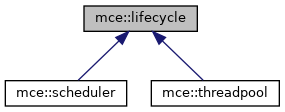an interface for implementing lifecycle control operations More...
#include <scheduler.hpp>

Classes | |
| struct | implementation |
| virtual interface for implementors of lifecycle More... | |
Public Types | |
| enum | state { ready , running , suspended , halted } |
| an enumeration which represents the lifecycle object's current state More... | |
Public Member Functions | |
| lifecycle (implementation *self) | |
| lifecycle (implementation *self, implementation *root) | |
| state | get_state () |
| return the state of the lifecycle | |
| bool | suspend () |
| temporarily suspend operations More... | |
| void | resume () |
resume any current or future call to run() after an suspend() | |
| void | halt () |
| halt and join lifecycle execution More... | |
Detailed Description
an interface for implementing lifecycle control operations
Member Enumeration Documentation
◆ state
Constructor & Destructor Documentation
◆ lifecycle() [1/2]
|
inline |
Any implementation of lifecycle should pass its this pointer to its lifecycle constructor.
◆ lifecycle() [2/2]
|
inline |
Call public methods with the root lifecycle implementation's methods.
Lifecycle objects can be structured as a tree, where lifecycle objects own other lifecycle objects: root - child1 - child1-child1
- child1-child2
child2 - child2-child1
- child2-child2
etc
If each child is given the root's pointer, then root's _impl() methods will be called when the child's public methods are called. This allows synchronized lifecycle operations no matter where in the tree lifecycle public methods are called from.
In short: if suspend()/resume()/halt()/etc are called on a child object, and the child object was constructed with a root lifecycle pointer, the root's suspend_impl()/resume_impl()/halt_impl() methods will actually* be called.
All parent lifecycle _impl() methods should only call child _impl() methods when interacting with child lifecycle objects. IE, _impl() methods should not call public lifecycle methods.
Member Function Documentation
◆ halt()
|
inline |
halt and join lifecycle execution
As a general rule, mce::lifecycle implementations are intended to run indefinitely and halt() should only be called on process shutdown. Failure to do so can cause strange program errors where code which is expected to run does not.
◆ suspend()
|
inline |
temporarily suspend operations
- Returns
falseif lifecycle is halted, elsetrue
The documentation for this struct was generated from the following file:
- inc/mce/scheduler.hpp